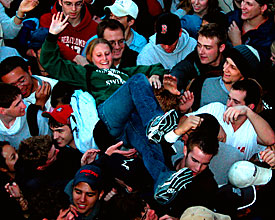 |
|
FILE PHOTO/Arizona Daily Wildcat
|
A UA student crowd surfs to safety after picking up her tickets during last fall's ticket fiasco resulting in police intervention.
|
|
By James Kelley
Arizona Daily Wildcat
Thursday April 17, 2003
After last October's adventure in front of McKale Center, the UA student government has been working on a proposal to distribute men's basketball tickets that is set to be announced at the end of April.
ASUA looked at how UA's peer institutions ÷ like Cal, Michigan and North Carolina ÷ distributed tickets. The group also talked to students from those schools to see if any their plans could help liven up McKale and offset the bluehairs in red sweaters sitting on their hands.
While it may be considered more of a peer institution on the playing field than in the classroom, ASUA need look no further than Stanford, which seems to have the ideal ticket solution. Stanford uses a point system to reward its "best fans," something UA needs to take into account when seeing who should get the coveted tickets.
In the 1998-99 season, the Cardinal was preseason number one in men's basketball, and while distributing tickets before the season, a ruckus broke out.
Sound familiar?
Only at the Farm, the students in the front of the line came up with a solution ÷ they dropped out of school and founded a company that tracked game attendance using student identification cards, rewarding students for going to games.
Student tickets at Stanford go through the "Sixth Man Club," which sometimes oversells tickets by 1,000 more than the nearly 1,000-seat student section can hold. Students buy the right to join the club and tickets are sold on a game-by-game basis.
In 1999, Stanford ran into trouble with its big games against UA, Cal and UCLA, not to mention low attendance at games against bad teams. To remedy these issues, Stanford implemented a point system plan. This is where UA, while still selling season tickets, can liven up the student section and get more people to come out to its other elite sports. The athletics department can award points to students for going to the so-called "smaller sports" on campus.
As a result of weeding out the kind of people who don't go to other sports and wouldn't even care at all if Arizona didn't win 20 games and make the tournament every year, it would go a long way toward giving UA the kind of homecourt advantage that Stanford has. No, the Palo Alto advantage does not come from that stupid injury-causing floor that no opponent likes to play on.
At any UA event aside from men's hoops, the attendance of college students is downright embarrassing. Little girls dominate the Final Four-caliber volleyball team's crowds. At least there are more 13-year-olds at the matches than at an R. Kelly party, so I guess that means it can't be all that bad.
To get more people to go to other UA sports öö which the athletics department undoubtedly wants öö and get the best student fans, which everyone except for the lottery supporters and most of the Viagra crowd (it takes a pill or a 15-0 run to get them up) wants, students who camp out behind the opponent's dugout at Sancet should be rewarded.
UA could easily form a system where a cardboard ticket sheet includes a section where half is torn off when a student enters, and half when they exit. One or two exits can be set up, so UA doesn't have to keep up too many stations, with students having to stay for more than an inning of baseball, a half of soccer, or a single tennis set.
The week of Stanford's big games ÷ Arizona, Cal and UCLA ÷ an e-mail is sent out with the numbers of guaranteed seats. Students can line up at 6 a.m. on game day to get coveted seats. There is a standby line, with a small number of seats reserved for those deficient in points, and a line for those that are guaranteed admission.
Some famous highlights of the Sixth Man Club, whose members research each of Stanford foes, are when they sang "Who Let the Dogs Out?" when Cal's cheerleaders took the court at Maples or when the club members found the schedules of Oregon players and made fun of the courses they were taking.
The garbage the UA student section pukes up now is simply not funny. There is one guy who felt the need to yell, "You suck, T.J., you suck," at T.J. Ford all game when UA played host to Texas. I didn't know whether to laugh at the poor guy or cry at the thought that he got into this school.
The Stanford Plan could be Focused Excellence, but applied to sports; get as many of the best fans as possible. The hated lottery system gave as much of a shot for obtaining tickets to Molly-math-major as someone who actually knows who Chris Dunn is.
With the "Stanford Plan," none of the runaround is necessary, not to mention the caliber of fan is closer to Duke's Cameron Crazies, who are devoted enough to camp out for a month and a half for one game. Dookies must tent with people who have a different schedule than them so they can go to class. The implementation of a plan like this creates a better atmosphere all around, not just at basketball games. It helps to keep from the sudden influx of fair-weather fans, like at UA this year, that are just there to jump on the bandwagon.

